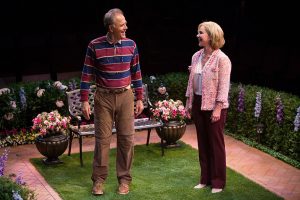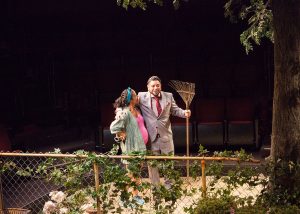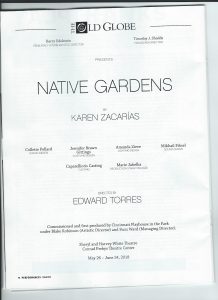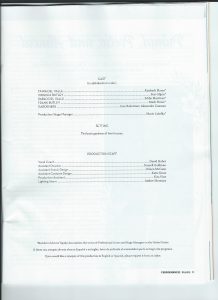What Does a Big Fence Do For Neighbors? Old Globe Comedy Has Some Ideas
Do good fences really make good neighbors, as Robert Frost wrote in a 1914 poem? Well, maybe, figures playwright Karen Zacarias in her darkish comedy Native Gardens, now at the Old Globe Theatre.
The fence on view is an ugly chain-link span, woven with indifferent ivy, that divides the back yards of two expensive, over-groomed homes in the Washington, D.C., suburb of Georgetown. Think Point Loma.
The Butleys are the deep-rooted home team, the Del Valles are the new kids on the block. An instant image of snooty WASP couple, soaked in Yankee privilege, vs. pushy Latinos clawing their way up the social ladder. But wait. One of Zacarias’ many points is that social distinctions are evolving and things may not be what they seem.
Retired after a long D.C. career at “The Agency,” Butley has readjusted his focus, with all the attendant stresses, to perfecting his fastidious garden fancy. As the scene opens, he’s finishing the bug-spray bath to the creamy Chopin of “Les Sylphides” when the new neighbor, conspicuously pregnant, waddles up to the scruffy side of the fence. At first, cordiality rules as she begins a sympathetic gush of her own vegetable ambitions. Except… is that poison he’s using? Oh, no! Won’t do. Just as all these imported mercenary plants must restore the field to the displaced native varieties.
Pressures are building on both sides of the fence. The finals of the Garden Club competition loom this weekend, and Butley, a long-standing runner-up, is determined finally to win. And the young husband arrives home for introductions with the news he has invited the whole law firm over for a backyard barbeque … this weekend.
It appears the metaphors are in place for a showdown with all sorts of implications: generational, cultural, environmental, gender, legal, racial, etc. As sullenness descends and contractors arrive, the opening salvo of survey reveals that the Del Valles own an additional two feet all along the fence which can gobble up a significant slice of Butley gardens for their choice of use. At current rates, that’s $38,200 worth of property, if that’s how the game is to go.
But come on! These are not symbols, just well-off neighbors. The De Valles are not militant campesinos. She’s from New Mexico, in D.C. to finish her Ph.D. He’s from a rich Chilean family, pursuing an earned opportunity to become a partner in an old-line law firm. Mrs. Butley is a pioneering female engineer in a defense-oriented corporation and when the old man mentions darkly the “friends I have at the agency,” he’s talking not about CIA assets but just fellow bureaucrats from his days at the General Services Administration.

Kimberli Flores, Eddie Martinez, Peri Gilpin and Mark Pinter, left to right, in Native Gardens at the Old Globe. Jim Cox Photo
Compromise well could follow except time is running out. And, as tensions tighten toward the brandished chainsaw level, a comedic deus ex machina is sorely needed. What better than the sudden, unexpected arrival of a new character to remove all other concerns and impose a shower of good will?
No spoilers here, except to observe that the comic conclusion of this soufflé is so concentrated and relentless in its sweetness that vividly ironic sarcasm is a definite suspicion.
The Old Globe polish much enhances this piece in the inventive hands of director Edward Torres, who never hesitates to borrow a bit from the klassic komedy kollection. (A couple gravely surveys their agriculture empire and a rake is handy? Grant Wood’s “American Gothic” will not be far behind.) I suppose this piece could be played on the stark set of Waiting for Godot but Torres has come to have fun. And set designer Collette Pollard is game. She figures out how to do mighty feats of earth-moving while he maintains the comedy pace by choreographing the workers to solemn tango rhythms.
Jennifer Brawn Gittings’ costume designs reinforce the stereotypes while leaving room for satire and Amanda Zieve lights the garden with breezy disregard of nature in favor of sweet comedy flavors.
The jokes about the character stereotypes are staunchly braced by the actors’ complex layers of resignation to the accurate sketches of the author. Mark Pinter as Butley is a monument to refined northeastern Puritan stock shifting down to retirement and Peri Gilpin shows the wear of decades in sterile meetings and required social showups as his wife. Kimberli Flores and Eddie Martinez as the new couple suggest that many stereotypes can disappear just from lack of interest. Each is a mixture of solid contemporary and a residual guilt almost ritualistic. Watch us quick, they seem to suggest, because we’ll be real different real soon.
The same, suggests this entire project, is true of the basic integration riffs that drive the show, all this talk of immigration and building barriers. How soon will all that be merely an appalling memory? Please?
(Continues in the Sheryl and Harvey White Theatre of the Old Globe at 7 p.m. Tuesdays, Wednesdays and Sundays; at 8 p.m. Thursdays-Saturdays; and at 2 p.m. Saturdays and Sundays through June 24, 2018.)

Welton Jones has been following entertainment and the arts around for years, writing about them. Thirty-five of those years were spent at the UNION-TRIBUNE, the last decade was with SANDIEGO.COM.






